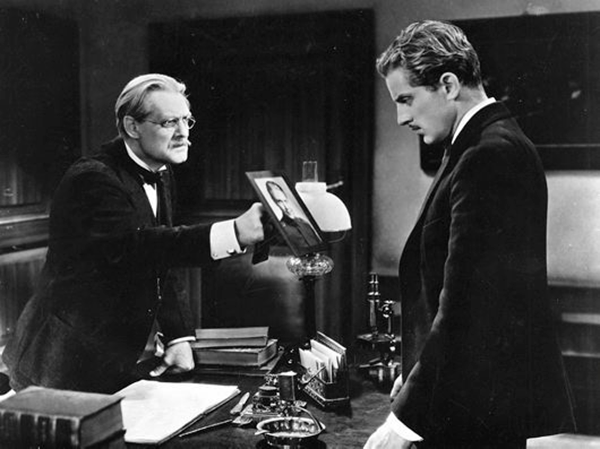
 German director Ernst Lubitsch
(The Shop Around the Corner, To Be or Not to Be)
goes out of his comfort zone to direct this melodramatic anti-war drama,
adapted from the stage play by Maurice Rostand. Set on November
11, 1919, the first anniversary of the end of the Great War (World War
I), the film starts with a Frenchman named Paul Renard (Holmes,
Dinner at Eight) visiting
Falsberg, Germany, a career musician racked with guilt over the man he
killed during the war, an enemy soldier named Walter Holderlin, who he
slew as he was finishing an impassioned letter to his girl back home,
Elsa (Carroll, Hot Saturday). Not even a confessional and absolution will conquer the
anguish he feels, eventually making contact with Walter's parents back
home, including Elsa, the subject of his love letters.
German director Ernst Lubitsch
(The Shop Around the Corner, To Be or Not to Be)
goes out of his comfort zone to direct this melodramatic anti-war drama,
adapted from the stage play by Maurice Rostand. Set on November
11, 1919, the first anniversary of the end of the Great War (World War
I), the film starts with a Frenchman named Paul Renard (Holmes,
Dinner at Eight) visiting
Falsberg, Germany, a career musician racked with guilt over the man he
killed during the war, an enemy soldier named Walter Holderlin, who he
slew as he was finishing an impassioned letter to his girl back home,
Elsa (Carroll, Hot Saturday). Not even a confessional and absolution will conquer the
anguish he feels, eventually making contact with Walter's parents back
home, including Elsa, the subject of his love letters.
By today's standards, some of the films themes may seem obvious and
heavy-handed in approach, especially in how peace is exalted from
people who wear weapons meant to slay their fellow man. Part of
it is due to the film being in that period just after the silent era,
where body movements are more pronounced, and performances are a bit
more on the theatrical side.
And yet, the film's best moments come from the understated touches in
the story, including the statement by Walter's father (Barrymore,
Key Largo) on the last day
he would see his son prior to going to battle; he cheered him on his
way to his death. The nationalist feelings make Germany a
particularly dangerous place for a man who fought on the side of those
who killed many of the local sons. Interesting is the fact that,
though Paul goes to Walter's family to find forgiveness, he has a
difficult time confessing in the face of people who find a healing
force in him to overcome their grief for their fallen loved one.
Even further, he fosters the notion that he had actually been a friend
to the man he killed, unable to inflict further anguish on an already
distraught family.
Also astute are the observations that those who are far away from the
war persist in activities that prove to be cancerous to their own
well-being, from continuing to foster violent sentiments toward those
on the other side of the fence, and the scandalous gossip at who might
be romantically seeing whom in their own town.
Broken Lullaby proved not to be a very successful film for
Lubitsch, a director mostly known for his work in comedies, to which
he would return without attempting another drama. It's a shame
that the film's pacifist, anti-nationalist sentiments didn't catch on,
especially in Germany, just on the cusp of Hitler's rise to power.
Poignant in spots, but a bit hammy by today's standards in execution,
the film would be remade successfully by Francois Ozon in 2016 as
Frantz.
Qwipster's rating:







©2017 Vince Leo

 German director Ernst Lubitsch
(The Shop Around the Corner, To Be or Not to Be)
goes out of his comfort zone to direct this melodramatic anti-war drama,
adapted from the stage play by Maurice Rostand. Set on November
11, 1919, the first anniversary of the end of the Great War (World War
I), the film starts with a Frenchman named Paul Renard (Holmes,
Dinner at Eight) visiting
Falsberg, Germany, a career musician racked with guilt over the man he
killed during the war, an enemy soldier named Walter Holderlin, who he
slew as he was finishing an impassioned letter to his girl back home,
Elsa (Carroll, Hot Saturday). Not even a confessional and absolution will conquer the
anguish he feels, eventually making contact with Walter's parents back
home, including Elsa, the subject of his love letters.
German director Ernst Lubitsch
(The Shop Around the Corner, To Be or Not to Be)
goes out of his comfort zone to direct this melodramatic anti-war drama,
adapted from the stage play by Maurice Rostand. Set on November
11, 1919, the first anniversary of the end of the Great War (World War
I), the film starts with a Frenchman named Paul Renard (Holmes,
Dinner at Eight) visiting
Falsberg, Germany, a career musician racked with guilt over the man he
killed during the war, an enemy soldier named Walter Holderlin, who he
slew as he was finishing an impassioned letter to his girl back home,
Elsa (Carroll, Hot Saturday). Not even a confessional and absolution will conquer the
anguish he feels, eventually making contact with Walter's parents back
home, including Elsa, the subject of his love letters.